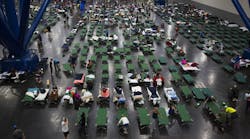Copyright Erich Schlegel/Getty Images
Hurricane Irma One-Month Progress Report Details American Red Cross Relief Efforts
Oct. 27, 2017
The American Red Cross issued a detailed one-month progress report this week on its efforts to provide food, water, shelter, relief supplies, health support, casework services and other aid to people affected by Hurricane Irma.
"This devastating storm hit the southeast only weeks after Hurricane Harvey slammed into Texas, and the Red Cross responded to both disasters, providing emergency relief to hundreds of thousands of people. In Florida, people will be recovering from Hurricane Irma for months – if not years – to come," said Brad Kieserman, vice president of Disaster Services Operations and Logistics for the Red Cross. "Thanks to the generous support of our donors, the Red Cross was able to provide comfort and support to people with nowhere else to turn, and now we will be there to help them recover and rebuild their lives."
Hurricane Irma made landfall in the Florida Keys on September 10 as a Category 4 storm, the strongest hurricane to make landfall in the U.S. since 2005. Before hitting the U.S. mainland, the massive storm carved a path of destruction through the Caribbean, devastating several island countries, including the U.S. Virgin Islands and parts of Puerto Rico. In Florida, Irma caused damage from Naples to Jacksonville and brought flooding and wind damage across the southeast as far as Georgia, Tennessee and the Carolinas.
Today, communities impacted by the storm continue to recover, and the Red Cross is working with government and local partners to help residents connect with critical services and resources they need to get back on their feet.
In addition, the American Red Cross has provided aid to Caribbean nations impacted by Hurricane Irma, which includes making a $100,000 contribution for Red Cross disaster relief in St. Kitts and Nevis and Antigua and Barbuda—and $200,000 towards Red Cross relief efforts in Cuba.
WHERE YOUR DONATIONS ARE GOING
As of Oct. 10, the Red Cross raised $56.4 million in designated donations for the Irma relief effort. All donations earmarked for Hurricane Irma will be used to support relief and recovery efforts for this disaster. Learn more about how donations are helping in this video or in our detailed report. The following are examples of how donations are being used:
